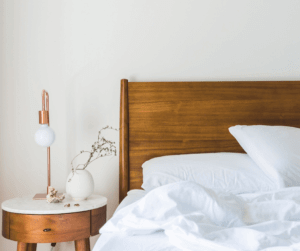 There are many factors that can affect one’s well-being and overall day-to-day life. One of the biggest elements for wellness, and possibly the most difficult to get on track, is sleep. Creating good sleep habits can truly enhance your quality of life in a big way. But for many Americans, sleep can be hard to come by with everyday stress and the uncertainty of the future.
There are many factors that can affect one’s well-being and overall day-to-day life. One of the biggest elements for wellness, and possibly the most difficult to get on track, is sleep. Creating good sleep habits can truly enhance your quality of life in a big way. But for many Americans, sleep can be hard to come by with everyday stress and the uncertainty of the future.
Keep reading for tips on how to stop tossing in your sleep and start living the well-rested life you deserve.
1. Invest in comfortable bedding.
Your mattress and pillow set up can be a deal breaker when it comes to getting a restful night’s sleep. When choosing a mattress make sure it is comfortable and supportive for any back problems/other health issues you may have. It’s estimated that a good mattress should last anywhere between 9-10 years. Also, quality pillows can enhance comfortability and the way you’ll feel in the morning.
2. Establish a sleep schedule.
Creating a sleep schedule can be helpful with ensuring you get the recommended hours of sleep. Once you’ve gotten into the habit of the schedule, try not to sway from it during the weekends or off-days. Going to bed around the same time each night can help regulate your body’s clock and can help you stay sound asleep throughout the night.
To avoid any disruption in your sleep schedule, be wary of napping. While napping is a good way to make up for lost sleep, if you have trouble falling asleep or staying asleep at night, napping can make things worse. Limit naps to 15 to 20 minutes in the early afternoon.
3. Limit TV and phone access before bed.
Scrolling on your phone or watching TV before bed can sometimes cause it to be difficult to fall asleep. It’s advised to avoid bright screens 1 to 2 hours before hitting the sack. Consider listening to music or audible books to wind down before bed.
4. Exercise during the day.
It’s well-known that regular exercise promotes a healthy lifestyle. But did you know routine exercise can also help you sleep better? It’s true. Regular exercise can improve symptoms of insomnia and sleep apnea and increases the amount of time you spend in the deep, restorative stages of sleep. However, timing is everything when it comes to exercise and sleep. You don’t want to exercise too close to bed as it can interfere with your sleep. Consider working out in the morning or early afternoon.
5. Take control over your sleep environment.
Where you sleep should be calm and a place that promotes good sleep. Keep your space cool, dark, and quiet to enhance sleep. Make sure your bed is comfortable and supportive with blankets that are not restrictive for stretching out. Reserve your bed for only sleep and intimacy. Work and other tasks should be done off the bed.
Quality sleep is a true component in wellness and should be taken just as seriously as diet and exercise. Consider these tips if you have difficulty snoozing.